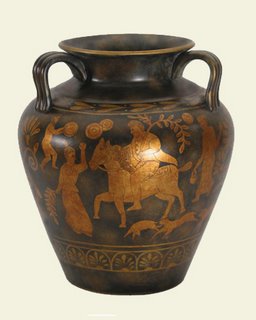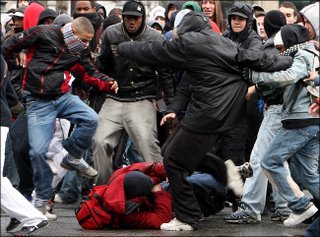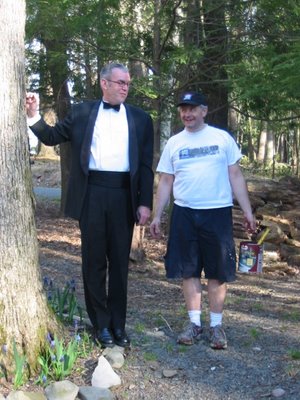Thursday, February 22, 2007
Addicted to War
I was raised in a family of Quakers--the Society of Friends, the proper name. While the religion teaches absolute pacifism my father fought in World War II and Korea. I came of age just as the USA withdrew from Vietnam. I do not believe in absolute pacifism but would never have fought in Vietnam or Iraq, wars we undertook inappropriately.
That said even as a 50-year old man I can still hear the call of battle, and almost regret being untested, unproven and unformed by its horrible rigors.
That odd sense of loss has always been stirred by the wonderful movie Patton.
Tuesday, November 14, 2006
...type, type, type...
Why?
Imagine that the universe was a practically endless field on which you could lay out every possible combination of events necessary to generate life--presence of raw materials, appropriate proximity to a star, animating events, etc. Given the nearly infinite scope of that imaginary field--the universe--the emergence of life is, in fact, practically unavoidable.
Consider the issue from another angle: it has been said that if you have enough monkeys typing for long enough one of them will replicate the works of Shakespeare. This sounds absurd until you imagine that you have a near infinite number of monkeys and typewriters. Given that, success becomes inevitable. So it is with life.
Is God missing from this picture? No. God's being is the fabric of the universe animated by his grace and emerging from his creative pulse, some 15 billion years ago.
Tuesday, November 07, 2006
What Are The Chances?

I do this gratuitously philosophical training module, which I might call 'What are the chances?' In it, I step the students through their lives in reverse, noting moments that would have led them somewhere other than NYC in this particular moment ... class, career path, etc. I then extend the exercise to their families, home towns, respective nations, the earth, solar system, etc., back to the Big Bang. (A bit like the scene from Our Town.) From all this we are able to do a rough calculation of how infinitely improbable it is that we find ourselves here and now. I show them a picture of a person standing on the tippy top of a pyramid to illustrate the point. But then I ask them again what the chances are that they are here. It's a trick question in that the answer given that they are here is 100%.
The sense from the ensuing conversation is that miraculously--god or no god--we are here against incredible odds and that means, in a sense we arise inevitably from an environment well suited to bear us up--a beautiful idea. And even if this weren't true, it can be significant if one student hears it and believes it. Because, then, they might take the chance in the next moment to do something truly weird but deeply true to their deepest natures, and from that something beautiful might arise.
Wednesday, September 20, 2006
Buy!
'Buy the appliance and your life will never be the same,' the salesman said as he drove his pitch to its climax. Pretty corny. But even though the guy had a steely edge, I was hooked. 'I really do need to slice my vegetables a whole new way,' I thought, '…and two for the price of one, no less!' I looked in my wallet and found nothing but dry cleaning slips. Then I noticed it almost
I walked next to the salesman's platform on the way out and looked up at him again. There was something dark in the corner of his mouth. 'That's gross,' I thought, 'What the hell is that?'
It was blood.
Somewhere during his spiel he'd bitten his lip or burst a vein or some such. Whatever it was or however much it hurt, he didn't stop. 'This sales thing is a primal business,' I thought as I waited for the bus. I changed my mind and decided to walk by the stables on
'That's the world, man, you gotta sell or die.'
Wednesday, July 12, 2006
Where there is despair . . . hope.
Sunday, July 09, 2006
Wednesday, July 05, 2006
Really Close ...

"Through dance, we're as close to God as we're going to get — until he calls us home."
Friday, June 30, 2006
Tuesday, June 27, 2006
Friday, June 09, 2006
Saturday, June 03, 2006
The World as I Found It
 As I was walking through the 204th Street A Train station in 'Upstate Manhattan,' I happened to see this. It's a panel where they hang posters. This is what happened after they took down the old poster and hadn't put the new one up.
As I was walking through the 204th Street A Train station in 'Upstate Manhattan,' I happened to see this. It's a panel where they hang posters. This is what happened after they took down the old poster and hadn't put the new one up.Is it art?
Well to me it seems beautiful in a way. I wouldn't hang it over my couch but there seems to be artistry here. It arises from the interaction of random patterns left by bits of glue and old poster, and from the choices that someone made to 'decorate' the spaces in between--the random and the intentional.
 Perhaps even more interesting is the way nature presents a mix of order and chaos without a visible artist. Having seen beauty arise from the work of artists, do we not require that God exists given so much beauty in nature?
Perhaps even more interesting is the way nature presents a mix of order and chaos without a visible artist. Having seen beauty arise from the work of artists, do we not require that God exists given so much beauty in nature?By the way, check out this outrageous site from which I got this picture.
Wednesday, May 10, 2006
Work
 Here's Prince Arjuna on bended knee before his part-time charioteer and full-time god Krishna begging out of his job as a warrior just as the battle is about to start. This story is told in the Bhagavad-Gita, which has become a central episode in the epic Hindu scripture of the Mahabharata.
Here's Prince Arjuna on bended knee before his part-time charioteer and full-time god Krishna begging out of his job as a warrior just as the battle is about to start. This story is told in the Bhagavad-Gita, which has become a central episode in the epic Hindu scripture of the Mahabharata.Their discussion yields a mythos and logos for moving in and through the world in peace--the paradox being that throughout the work Krishna tells Arjuna to fight because he was born a warrior.
Now the Bhagavad-Gita is very subtle, wonderful and strange but it just struck me this morning how at odds it is with our modern American view: work should be something that, at least potentially, we enjoy, that might help us achieve self actualization. Here, however, Arjuna hates his job but must do it or the community will collapse. Now, as a near pacifist, the choice of the allegory makes me uncomfortable but the concept, I think, is right.
But to the writers of the Bhagavad-Gita this zeitgeist is an anathema--the individual is here to participate in a community where everyone has a role to play. When such roles are taken on--and the grasping ego left behind--the individual is freed to become part of something greater than himself: a community.
I agree with Sartre that, at least at times, 'Hell is other people.' But, from what I can see, the only way this life makes sense for the individual is by doing his work for, and in community with others. As such, there is a paradox: Sartre was right but, it is also right to say that heaven is other people as well.
Tuesday, April 18, 2006
Friday, April 14, 2006
Flocks

For years I've held the idea of complexity in nature arising from very simple rules in my mind and, I suppose, my heart. I am often in awe when I watch a flock of pidgeons flying outside my bedroom.
This is particularly striking as I find the beasts themselves fairly objectionable. But in a flock in flight they are beautiful.
Monday, April 10, 2006
God in the News

There are a dizzying number of stories in the press about God this week. What with it being holy week for the Christians and the approach to Passover for the Jews it's hardly surprising.
These stories by the nature of the News media bring us 'new' information about God--a newly discovered gospel according to Judas, an op-ed piece in Sunday's NY Times noting that God and politics are by their natures mutually exclusive, and an article from Salon.com discussing all this madness surrounding "The Da Vinci Code."
In honor of Jesus, the last first. The Salon article exposes a lot of the hokum surrounding Brown's Code and reveals that the book upon which it was 'inspired'--Michael Baigent's "The Jesus Papers: Exposing the Greatest Cover-Up in History--is even worse. He suggests reading James Tabor's "The Jesus Dynasty: The Hidden History of Jesus, His Royal Family, and the Birth of Christianity" as having a stronger tether to the earth. Tabor speaks of the creation of Christianity in the very earliest years of the Church as a struggle between Paul, whose religion is what we now call Christian, and that put forth by Jesus's family headed by his brother James, which has faded away.
I would love to know what was lost.
Tuesday, April 04, 2006
Keeping Your Evil

The Bhagavad Gita contains one of the most illuminating ideas I've ever found. It states that the Creation--all the physical and metaphysical worlds--comprise three characteristics called Gunas: Satwa, Rajas and Tamas. Satwa is that which conducts consciousness, Rajas that which reflects consciousness and Tamas, which absorbs it. These characteristics are always present and always interacting with each other. Strengthen one and the others will reassert themselves. I've found this formulation descriptive of my life's experience.
Springtime perturbs the balance.
What does this have to do with evil?
Stay tuned ...
Friday, March 31, 2006
True or Beautiful or Both

Just a passing thought on a late Friday afternoon. Is Keats correct when he reads from his Greek urn telling us that "Beauty is truth, truth beauty?"
I think I buy it--he seems to say that truth is what is beautiful to us and, as such, that it is subjective.
I know from experience some ideas are beautiful but untrue.
Long before I was married--the second time--I said 'I love you' to a woman I had dated all too briefly. I meant it when I said it but it was said, shall we say, in a moment of passion and became untrue very quickly. And just like Meatloaf prayed 'for the end of time' after I similar slip so did I.
A Big Apple

A beautiful apple. An example of nature’s perfection—smooth to the touch, round to the eye, firm in the hand. The sight of it evokes memory of apples past: biting into it, the skin snapping, the cold appley meat breaking away—sweet and sour and, in a way, wonderfully obscene. The immediate unspoken sense is that this apple is somehow for me.
The fact that the apple and I have come to be here, now—to eat and be eaten—gives me a sense of order in the universe. I suppose the apple would disagree.
For me, millions of years of events, great and small, have led to this transcendental moment (and delicious snack!); for the apple, death. And this moment is a collaboration of my choice (to dine) and a universe—like this apple—whose deep nature is to offer me the opportunity to do so.
Thanks, apple; some day it'll be my turn.
Thursday, March 30, 2006
Creation
 The New York Times reports this morning of demonstrations in France infiltrated of by a group of young, violent criminals, the casseurs—the smashers. The demonstrations protest a new law allowing younger employees to be fired for any reason within the first two years. (Given what’s happened in America to the implicit contract between employers and the employed over the last 20 years or so this phenomenon seems a bit autre but that’s another topic.)
The New York Times reports this morning of demonstrations in France infiltrated of by a group of young, violent criminals, the casseurs—the smashers. The demonstrations protest a new law allowing younger employees to be fired for any reason within the first two years. (Given what’s happened in America to the implicit contract between employers and the employed over the last 20 years or so this phenomenon seems a bit autre but that’s another topic.)I’ve seen ‘smashers’ in like situations my whole life—riots across the United States against the Vietnam War, Martin Luther King’s assassination, and on and on. I’ve attended demonstrations against the war in Iraq and experienced the tension among participants, from granola pacifists to Palestinian revolutionaries to skinhead fascists to contemptuous Wall Street types.
Living in New York City I’ve wondered about the Draft Riots during our Civil War. Raised as a Yankee with a view of North as noble how can one understand three days of complete anarchy replete with arbitrary destruction, beatings, killings and public lynching? What lessons can be drawn from these happenings? What are the causes and how can we fix it? Or is it too much a part of humanity and the way of the world to be fixed?
The Small Writ Large
By my nature I cannot help but see these things as examples of things larger—and smaller. 180 million died in wars and various manmade calamities in the 20th century alone. Why? Violence within families continues to shock us as it comes to life through the newspapers and from those we know and love. Why?
The 20th century brought us the modern age—when rationalism would bring peace to the nations, when science and technology would allow us to rebuild the world in a way that wouldn’t keep burning down. But it kept burning down and it still is. There hasn’t been an end to history but we’ve certainly built weapons capable of bringing it on. Why? It doesn’t make sense. Despite President Eisenhower’s warnings regarding the ‘Industrial-Military Complex’ we’ve seen an unprecedented growth of the military over the last 25 years. Despite all the talk regarding the new threats we face we’re building multibillion-dollar weapons designed to respond to old threats we no longer face. (Perhaps we’re just getting geared up for the Chinese? After all they should be capable of challenging us in just a generation or two.) What is it about humans that we seem to be hardwired to kill each other? Is it that the lizard part of our brains still rules us to the extent that, if not Now, it’s gonna be Apocalypse Soon?
Part of me has always been an End Timer, a sort of New Age Left Behinder. I’ve had a sense of The End around the corner my whole life. I’m amazed to find myself alive, and almost fifty, living on the other side of the year 2000. I hadn’t really counted on the way life just “keeps on keepin’ on”—at least for me … so far. My mom’s passed on, my brother, all my grandparents, Aunt Betty, and on and on.

Still, life just keeps pushing up all around me. Just yesterday, my sister-in-law Sallie Sydnor Payne Carson (husband Brett) gave birth to a perfect, 22-inch, 9-pound, 14-ounce girl—Brantley Ann Carson. Here she is with her cousin Grace. My friends Don and Katie are due with their first child in the summer. Amazing!
Rationalism does not hold the answers. Our lives, and love, and hatred, violence and death are all--at core--mysteries. In a post-modern age, religion struggles to make sense of the world. Christianity tells of creation; struggles between God and mankind; convents made, broken and made again; God’s perfection and humankind’s imperfection reconciled through Christ’s grizzly death and resurrection. Father, Son and Holy Ghost—Creator, Redeemer and Sanctifier. The Hindus offer Brahma, Vishnu, and Shiva—Creator, Preserver and Destroyer. These traditions hold glorious/bitter mysteries in their hearts and can, at their best, help followers to fully understand and embrace life.
God both creates and destroys. And, it seems, mankind must as well. Perhaps that is what they meant--in part--when the Ancients said that we are made in God's image.
In closing, I leave you with a bit of wisdom grounded in the belief that if it's in a Broadway musical it must be true:
--La Vie Boheme, Rent, Jonathan Larson
Wednesday, March 29, 2006
Tesla

I've been reading a lot about the brilliant but largely forgotten inventer Nikola Tesla, the father of modern electricity. I'm struggling to write about his life but don't know how to tell his story as there are so many--polymath genius, bon vivant of the gilded age, eccentric recluse dying alone and in debt in the New Yorker Hotel in 1942.
In this picture from the end of the 19th century, he controls his equipment in the shadows lighting the bulb held by his friend Samuel Clemens, Mark Twain.
Nikola Tesla was born 150 years ago, a Serb in Smiljan, Croatia. His father was a priest, his mother an extraordinary and loving woman of intelligence and wit.
And so, on a dark winter's night ...
With his eyes still closed he sat up and made an oath. ‘Someday, somehow I will master the Falls.’ He repeated it softly and rocked slightly, enduring the cold.
Niagra was half a world away--and, of course, it simply made no sense--but since he first saw the picture of the Falls, the idea of it burned inside him though he was only 10 years old.
Suddenly something touched his arm and he was so startled he lost his balance and, trailing the bedding behind him, fell to the floor in a dull, down-cushioned thump. His mother, usually silent, laughed out loud.
“You look like a drunken bride,” she said.





